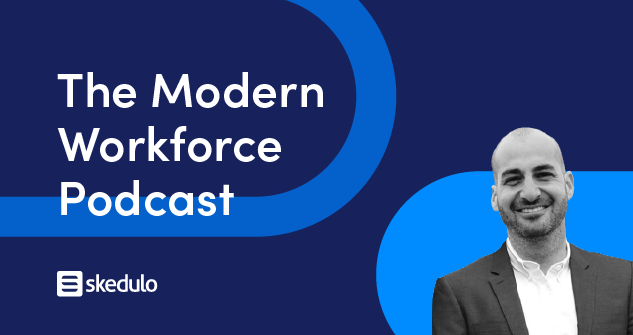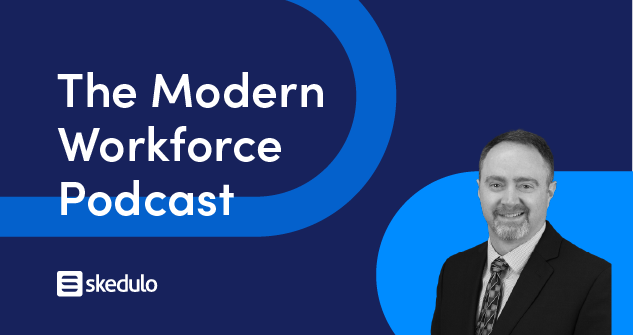The Modern Workforce:
How Thermo Fisher’s Supply Chain Never Stops During War, Labor Shortages, and a Global Pandemic
Omar Castillo

Global geopolitical issues exposed fragility of supply chains and forced companies to rethink how they create, sell, and deliver their products and services.
Omar Castillo, Sr. Director of Global Operations at Thermo Fisher Scientific, is experiencing this firsthand, as he leads Thermo Fisher Scientific’s value chain.
Recently on The Modern Workforce podcast, Omar joined us to discuss the biggest challenges to managing a deskless workforce and more.
Let’s get right to the conversation!
Deskless customer experience
The deskless workforce is a critical driver for success and the productivity challenges that have been brought about by recent economic pressures, both globally and on the continent, especially in the operations world at Thermo Fisher.
Customer experience is heavily influenced by the distributed, deskless workforce because field service engineering ensures the timely and functional delivery of Thermo Fisher solutions. Omar pointed out that the customer doesn’t see what happens in the factory but rather the technicians who deliver and install the product.
Spotlight on operations
Along with everything else, the pandemic accelerated customer expectation and the need to embrace change.
The pivot to hybrid work could have happened culturally or regionally — but it happened globally all at once. Without logistics and operations, that could never have come to pass.
“Operations is no longer behind the scenes,” Omar said. “It’s up front headlines, something that everybody’s discussing.”
More stakeholders are interested in supply chain and business continuity plans than ever before. “This is a great opportunity now to rethink how we do our work,” he added.
Adapting to environmental challenges
The heightened awareness about operations across industries and within households has highlighted several environmental challenges, especially to the European supply chain: the Russo-Ukrainian War, economic inflation, and energy supply disruption.
Global geopolitical issues have challenged us all to think harder about resiliency across the entire supply chain. Consequently, workers and leaders have needed to seek creative solutions to fortify the value chain.
“If something gets delayed, then you have to replan your entire delivery plans,” Omar said. “The magnitude of it is much harder to manage, it happens with a higher frequency, it requires more creativity to balance customer needs with these disruptions.”
These delays are further compounded by inflation, both in raw material components like energy but also in the cost of actually doing work. Omar referred to using tools to increase productivity and becoming more strategic about human mobility as potential mitigation to inflation costs.
Talent, agility, and innovation
Managers of today’s deskless workforce have talent on their minds — acquisition, retention, and development. Questions of morale, training, and upskilling are all urgent workforce concerns, according to Omar. “I spend a lot of time making sure that we keep our organization fit for a changing world,” he said.
The ever changing environment requires a distributed workforce to remain flexible or agile. Omar said that the innovation of resourcefulness, rather than inventing a new product from scratch, is what will give operations its needed agility.
“Continue thinking about how to do what we do better, differently, more resiliently. You’re not preparing for a specific event, you’re preparing to be flexible,” he advised.
To make sure you never miss an episode of The Modern Workforce podcast, follow us on Apple Podcasts, Spotify, or our website.

Omar Castillo is the Senior Director Global Operations & Managing Director (Geschäftsführer) at Thermo Fisher Scientific. As a global operations leader with strong people skills and energetic leadership approach, he is known for inspiring team’s commitment and high performance.
He brings many years of experience turning around and scaling manufacturing and supply chain organizations, maximizing value, operational competitiveness & market-focused execution.
He holds a BS in Industrial and Systems Engineering from Florida International University, and a MBA from UNC Kenan-Flager Business School, University of North Carolina.

Laura Przybek is the Marketing Director for the EMEA region at Skedulo. With 15 years’ experience in high growth, fast paced companies she is passionate about technology products that make an impact on a sector, challenging the status quo. Laura holds a BA (Hons) in Marketing and Management from The University of Newcastle upon Tyne and an IDM accreditation in digital marketing.




